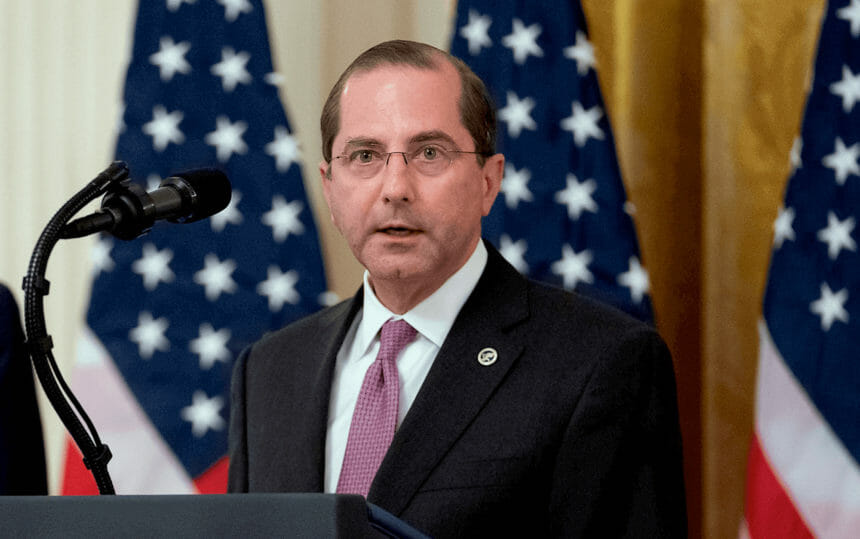
Nobody in long-term care is begrudging skilled nursing facilities for the $4.9 billion that began flowing to providers on Friday to fight effects of the COVID-19 pandemic, but associations are asking federal and state governments not to forget senior living operators.
The U.S. Department of Health and Human Services announced Friday that all nursing homes with six or more certified beds would be eligible for funds from the Coronavirus Aid, Relief and Economic Security (CARES) Act, with each provider receiving $50,000 initially as well as another $2,500 per bed.
“While Argentum appreciates that the administration is supporting nursing homes, we remain disappointed that it continues to overlook the senior living industry, which is caring for the same vulnerable population and has equally urgent needs,” Argentum President and CEO James Balda said. “Senior living communities — assisted living, independent living, memory care, and continuing care — critically need financial relief, as they have rising financial pressures due to added staffing and expanded operations, as well as the costs associated with purchasing [personal protective equipment] and test kits.”
Senior living operators are expected to spend “tens of billions” over the next year to battle COVID-19, he said. “This could cause extreme financial strain on this industry, which currently serves as a safe haven to residents and a backstop to the larger healthcare system. These communities also desperately need priority access to COVID-19 testing and PPE, but the government has prioritized nursing homes for these critical resources as well.”
American Health Care Association / National Center for Assisted Living President and CEO Mark Parkinson also called for funding for assisted living operators — from both the federal and state governments.
The CARE Act funds for skilled nursing were “much-needed” and appreciated, he said, but “[g]iven the gravity of the situation we are facing with this deadly virus and its impact on our vulnerable residents, long-term care facilities require additional support and funding from state and federal governments to reduce its spread. Notably, assisted living communities have yet to receive any direct aid, despite also serving vulnerable seniors.”
All long-term care facilities need additional testing, PPE and funding, Parkinson said.
LeadingAge President and CEO Katie Smith Sloan said LeadingAge was pleased with the funding to nursing homes, adding, however, that it “will only go so far in addressing providers’ growing financial needs as this pandemic continues.”
In addition to help for assisted living, LeadingAge is calling for additional funding and support for affordable seniors housing, pointing to a May 5 letter that Sloan sent to leaders in Congress.
In other coronavirus-related news:
- The Inn at University Village assisted living community in Tampa, FL, will serve as a transition unit for senior care facility residents discharged from hospitals following treatment for COVID-19, under an agreement with Hillsborough County. The community has set aside 60 beds in a separate wing to temporarily house people as they recover from the virus and before they return to their previous residence. The county’s Senior Care Facility Rapid Response Task Force is overseeing the initiative.
- The Federal Emergency Management Agency must expand the distribution of PPE to include assisted living communities and intermediate care facilities, not just nursing homes, members of Congress from Colorado said in a bipartisan letter to FEMA on May 19. These types of operators also care for Medicaid beneficiaries, the members of Congress said, adding, “[T]hey too have faced staggering infection and death rates and are in desperate need of these resources.” The letter-writers also are asking that PPE deliveries to nursing homes be continued through June and July.
- The Pennsylvania Department of Health has admitted that publicly reported, facility-specific COVID-19 data for assisted living communities, personal care homes and nursing homes was inaccurate and pledged to correct it. The Pennsylvania Health Care Association had urged the department to immediately correct the errors in the flawed report, saying it created panic and anger among family members, distrust among staff and frustration for providers.
- North Dakota is forming a task force of residents, family members, state politicians and the North Dakota Long Term Care Association to come up with a solution on how to reconnect long-term care facility residents with their loved ones as the state reopens businesses.
- Wyoming Gov. Mark Gordon outlined a $325 million plan to aid businesses affected by the coronavirus pandemic, including a plan to increase testing at assisted living communities and nursing homes. The state wants all facilities to test at least 20% of their residents and staff every two weeks.
- Wisconsin Gov. Tony Evers announced that he is directing $100 million in federal relief funding to providers of long-term care, home- and community-based services and emergency medical services. The CARES Act funding will support expenses related to COVID-19, including overtime pay, changes to sanitation procedures and disruptions to care.
- A Pennsylvania independent living, assisted living and memory care community is among those bucking the coronavirus death trend. Arbour Square at West Chester has not had a single coronavirus case since precautions were put in place in mid-March.
- Now is the time to reform policies, practices and financing for long-term care facilities, according to a Next Avenue article that suggests ways to fix what is troubling the system and offers a glimpse into the potential future of long-term care facilities. Among those quoted are National Investment Center for Seniors Housing & Care co-founder Robert Kramer and LeadingAge Senior Vice President Robyn Stone, Dr.PH.
- Three Denver senior living communities are facing accusations of not following health orders “in an intentional or egregious way.” The citations for Argyle Assisted Living, Carillon at Belleview and Harvard Square could result in fines, jail time or even criminal charges.




